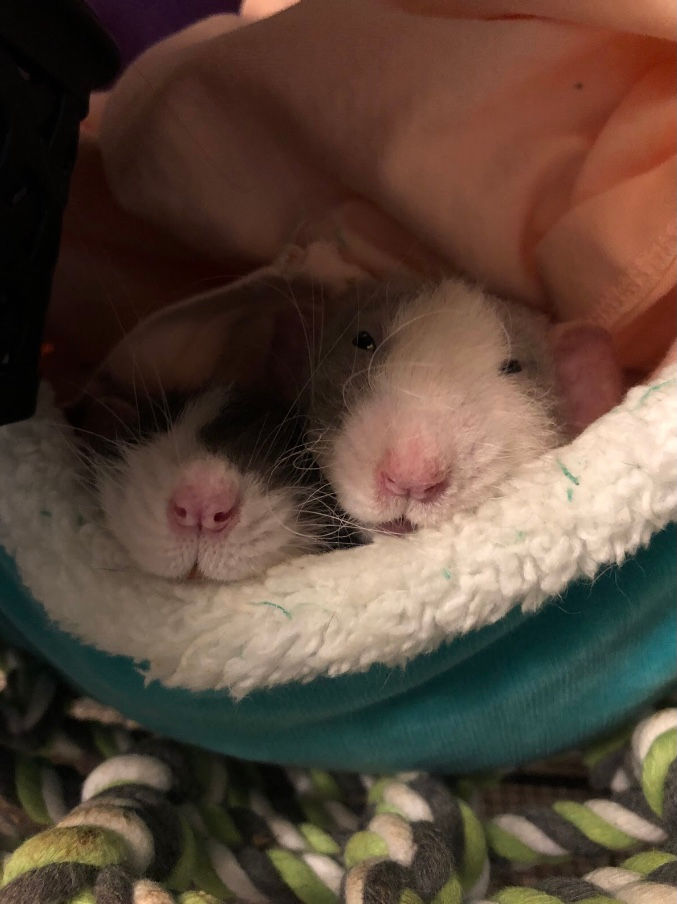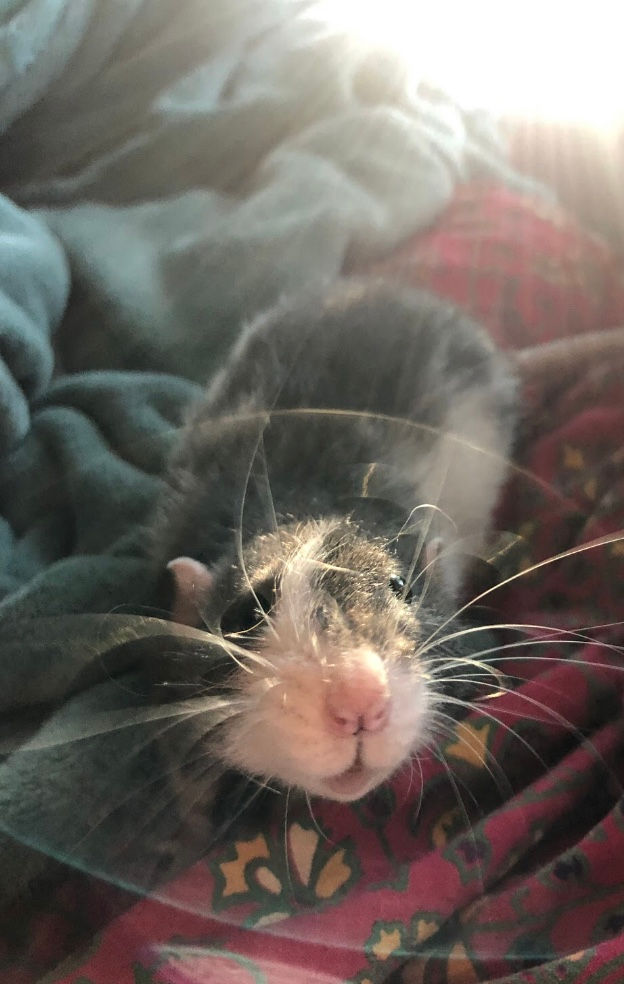What Adopting two Rats Taught me about Animal Sentience
- Chelsea Pinkham
- Dec 2, 2020
- 3 min read
In August of this year, I unexpectedly took in an odd pair of animal companions: rats. One of my good friends had bought the two brothers, Lion and Siegfried, as babies when living in New York; but because of an unexpected housing change due to the COVID-19 pandemic, she had to suddenly part with them. All of my friends know that I am the one to call when an animal is in need of help, and though I had never kept rats before, I agreed to take them in. Though my original intention was to foster them, I ended up falling love with the pair and keeping them.
The first thing that struck me was the dog-like affection and friendliness. Siegfried and Lion come when they are called, are completely unafraid of people, like to snuggle up on laps and give kisses just like puppies. It became incredibly clear within days of adopting them that the two were unique individuals with distinct and opposite personalities; Siegfried is incredibly intelligent, a fast learner, and an affectionate pet, while Lion...not so much those things (but we still love him).
I bought a dog training clicker to experiment with teaching them tricks using positive reinforcement, and within a week, had taught them both to shake hands, spin in a circle, and jump through a hoop on command. Youtube videos show rats learning to play basketball, fetch, raise flags, retrieve objects such as tissues, balance on a ball...you name it, rats can learn it, likely faster than your dog.
Lion and Siegfried are completely litter box trained, and if they are playing out in my room, will run back to their cage to poop in the box like a cat. They have their own personal preferences: Lion loves mint while Siegfried despises it, and Siegfried likes Spinach while Lion would rather starve. Siegfried likes peas but will spit out the skin; Lion will gladly eat them whole. They both go absolutely feral for Trader Joe’s peanut butter pretzels.

They sleep in a fleece hammock together, spooning and snuggling like two little humans. While rats are not exactly seen as cute and cuddly to the average person, it would be impossible to spend an hour with them and not come to the conclusion that they are conscious, thinking individuals, full of personality and life.
My observation is well-backed by science. A widely cited 2011 University of Chicago peer-reviewed study highlighted rats as models of empathy and altruism, and found that a free rat will nearly always press a lever to free a fellow rat restrained in an uncomfortably tight plastic tube. Even when the free rats were not given physical access to the restrained rats’ area, they still chose to free them, disproving the theory that the free rats were selfishly seeking a companion. Most shockingly, the majority of rats chose to free their restrained companions over access to chocolate chips, a highly desirable treat.
A more recent 2020 study published in the journal Current Biology faced rats with a dilemma: pull a lever and receive a tasty sugar treat, but only at the cost of delivering a mild electric shock to a neighboring rat in plain sight. The vast majority of rats stopped using that lever and switched to another, demonstrating harm aversion, a well known trait in humans.
Rats have been the subject of numerous studies assessing empathy, altruism and emotional intelligence in recent years, and the evidence is overwhelming: hated as they are, these intelligent rodents are fully capable of experiencing a complex range of emotions.
But despite all of this, rats are used and abused by the millions in cosmetic research. The 1966 Animal Welfare Act, one of the United States’ only federal animal protection laws, excludes rats; legally they are not even animals, and however painful of an experiment a cosmetic testing facility wishes to carry out on a fully conscious rat is fair game. Over 100 million mice and rats are killed in laboratories annually, living bleak existences lacking the constant enrichment and stimulation that Lion and Siegfried are granted every day. Many people who could never imagine inflicting harm on Lion and Siegfried unknowingly support cosmetic brands which carry out incredibly painful experiments on rats no less intelligent or deserving of compassion.

Even if rats as companion animals aren’t your cup of tea, it’s easy to agree that they are deserving of basic respect. Rats demonstrate empathy in their interactions with each other, so it should be a given that we demonstrate empathy towards them whenever possible. Luckily, cosmetic animal testing is on its way out. In 2020 a new California law went into effect banning the sale of cosmetics tested on live animals, the first of its kind in the United States. You can do your part to normalize this movement by refusing to purchase cosmetics and household products tested on animals.




Comments